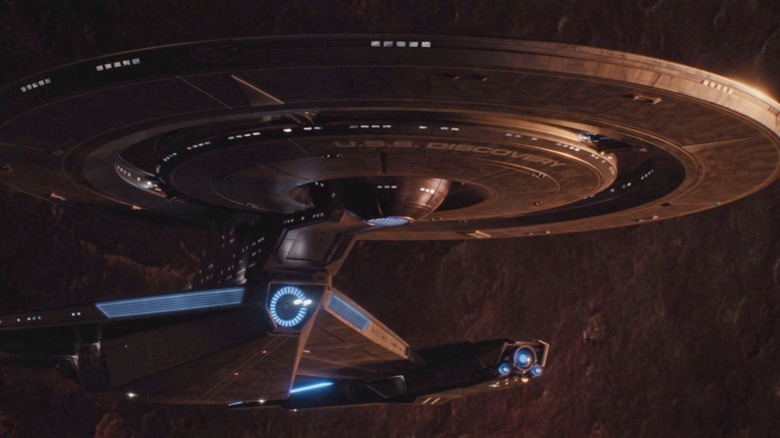How Star Trek: Discovery Keeps Its Sci-Fi Stories Feeling Real
"Star Trek: Discovery" ended its fourth season back in March, wrapping up a story that involved a mysterious, destructive spatial phenomenon called simply the Dark Matter Anomaly, or DMA. After a good deal of galactic investigation, the crew of the U.S.S. Discovery found that the DMA was created by an outside, non-humanoid, non-verbal alien species called Species 10-C. Michael Burnham (Sonequa Martin-Green) eventually learned that Species 10-C created the DMA as a means to power a protective supra-shield it had made for itself. They didn't realize the destructive power the DMA had.
At the beginning of season three, the premise of "Discovery" changed. It was no longer set in the decade before the events of the original 1966 series, but was thrown nearly a millennium into the future to see what the Federation looked like after a galaxy-wide cataclysm robbed the organization of its typically-trusted diplomatic clout. Season five of "Discovery" is set to debut in early 2023, and the showrunners have promised that it will look back into Trek's past — although sans time travel.
Looking into Earth's past — that is to say, our present — appears to be a savvy move. At least that's the way director/producer Olatunde Osunsanmi feels. In an interview with The Nerds of Color from this past March, Osunsanmi pointed out that the 10-C storyline not only allowed the writers on "Discovery" to delve into science and language more than they had in the past, but that moving forward, they might be able to look into what's happening on Earth right now for a timely space alien story.
Species 10-C broke things open
Osunsanmi was very proud of Species 10-C. Alien species have notoriously had to remain humanoid for the bulk of "Star Trek," probably because human actors had to play them. With more advanced special effects tech at their disposal, the makers of "Star Trek: Discovery" were finally granted the leeway to make an alien species look as strange as they could imagine. Species 10-C also communicated nonverbally, expressing themselves through a combination of sympathetic vibrations and flickering lights on their bodies. Osunsanmi was energized by inventing such a species, and when asked where "Discovery" can go next, he declared that he wanted more scientific writing that required research.
"We were really outside of the box of Star Trek with the 10-C of what we've done, particularly on 'Discovery,' we tried to make it the most unique creature of all time. I don't know if we got there, but it's certainly got to be one of the most unique creatures ... We got into a lot of science in episode 12, and a little bit of 13, with ... communication. Because the translator doesn't work, and we brought in people to help with that. And I think I think I think all this takes on more realism."
"Discovery" reportedly hired linguists and xenobiologists to aid them.
But it was the real world that seemed to inspire Osunsanmi the most. As it was announced in 2021, UFOs are real. With that information, what does a sci-fi show about alien contact do? The idea of meeting an alien species is now that much further from the realm of fiction. "Star Trek" may have to recalibrate to fit that new information. Indeed, it could mean a coup for the whole genre. Osunsanmi chooses to be thrilled at the prospect.
But what if UFOs are real?
"Star Trek" was, of course, created as Gene Roddenberry's reaction to the injustice he saw in the world. In the future of "Star Trek," capitalism is dead, technology has been peacefully mastered, humans have overcome nationalism and racism, and our species now works together to explore the heavens. It was a deliberate message to the world. Humans may not be at peace in 1966, but in an imagined 23rd century, we'll be fine.
With sci-fi notions of the past becoming real, however, Osunsanmi realizes that "Star Trek" now needn't remain in the realm of sci-fi. Now, he says, "Star Trek" can become something of a true story. Or at least connect to a true story. He said:
"We can base 'Star Trek' on real events! We now know UFOs are real. The Pentagon acknowledged they don't know what these are. All that needs to happen now for 'Star Trek' to be literally legitimate. The next step which is to ask questions. 'That's not China. It's not Russia. It's not us who's driving it?' And that's Pandora's Box. Once we open we just closed it again ... Whatever is driving is not human, whatever that means. We are now crossed over to the reality of 'Star Trek.'"
In previous generations, "Star Trek" pulled from modern-day social issues and transposed them into a sci-fi context in order to handle said issues with a more frank attitude. According to Osunsanmi, the path forward will be to also transpose real aliens into "Star Trek."
Well, if that's what's actually piloting those UFOs. The truth is out there. "Star Trek: Discover" is slated for premiere in early 2023 on Paramount+.


